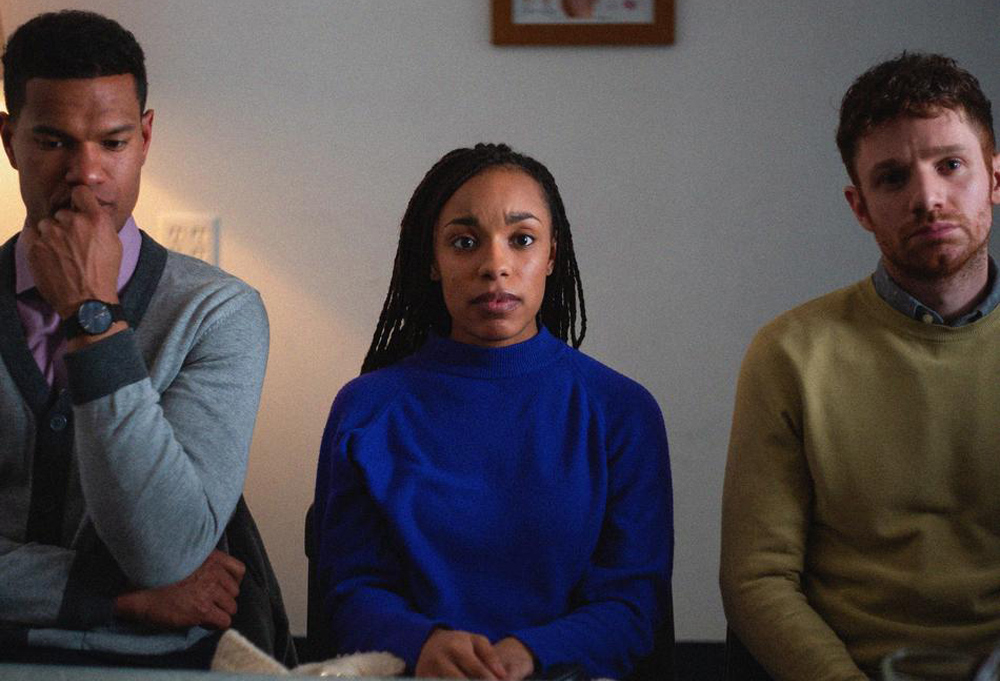“The hardest part of this pregnancy has been not drinking Kombucha,” says Jess (Jasmine Batchelor), at lunch with friends in “The Surrogate,” the kind of casual comment she’s been making for years to put others at ease without much regard for herself. In fact, there hasn’t been anything easy about this pregnancy, except for Jess’ decision to bring a child into the world for her old classmate from Sarah Lawrence, Josh (Chris Perfetti) and his partner Aaron (Sullivan Jones), thinking nothing of the nine-month commitment she’s about to make or to receive any compensation in return. However, Josh and Aaron have a lot to ponder when it’s learned that 10 weeks into the pregnancy, their child-to-be will have down syndrome thanks to an extra chromosome and while Jess is carrying the fetus, her longtime friends grapple with a lifetime raising a child that they may not have the time and resources to care for properly.
It’s an impossible premise that remarkably writer/director Jeremy Hersh does justice to in his arresting first feature, which seems to share an obvious connection to Cristian Mungiu’s “4 Months, 3 Weeks and 2 Days” when terminating the pregnancy starts to be strongly considered, but actually reminds in other ways as it follows Jess like a shark through treacherous waters to come to her own decision about whether to bring what’s growing inside her to term. Forgoing most cinematic artifice such as music or heavy-handed editing, scenes in “The Surrogate” arrive in succinct bursts as they present how something that was once such a simple prospect for Jess comes to overwhelm her as an open-hearted 29-year-old who becomes disillusioned as she warms to the idea of caring for the child herself while everyone around her grows colder, from Josh and Aaron, who fight amongst each other about what to do, to her mother Karen (Tonya Pinkins), who thinks she’s locking herself into a life she’ll eventually regret.
To watch an effervescent screen presence such as Batchelor dim even a little as the eternally idealistic Jess is devastating, and cinematographer Mia Cioffi Henry forges such a strong bond with her, putting Jess front and center at all times, that “The Surrogate”’s deceptively unfussy framing, often stationary and pivoting only when need be, expresses the character’s belief system falling apart when the camera gets more frenzied. While the story rests squarely on Jess, Hersh’s attention to all the characters around her with their own competing wants and needs results in a consistently provocative drama raising all kinds of issues that one could hardly imagine when it begins. You can see how they all make an impression on Jess, sometimes changing her mind or pushing her to become more resolved, particularly Bridget (a fantastic Brooke Bloom), the mother of a precocious son with down syndrome who may try to say all the right things in front of her, but can’t hide her weary eyes or exhausted ramblings from all the energy it takes.
So much of “The Surrogate”’s power comes from being able to have two things be true at once, making the sensible decision for Jess at any given moment rife with consequences for all the people that are most important to her and the film’s thorough and thoughtful consideration of every angle is not only admirable as far as presenting all sides of an argument, but dramatically satisfying when so often you’re made to process the unexpected fallout as much as its lead. “The Surrogate” may leave much in shambles by the time it’s over, but what Hersh and crew have put together here is quite mighty.
“The Surrogate” is now available to stream here.




